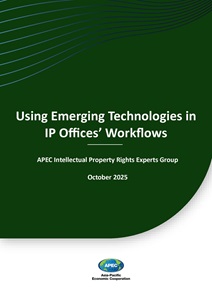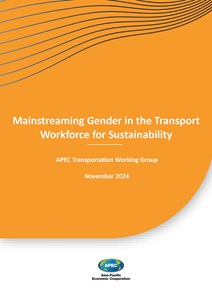
Reports
Using Emerging Technologies in IP Offices’ Workflows
The Asia-Pacific Economic Cooperation (APEC) is a regional economic forum established in 1989 to leverage the growing interdependence of the Asia-Pacific.
The Asia-Pacific Economic Cooperation (APEC) is a regional economic forum established in 1989 to leverage the growing interdependence of the Asia-Pacific.
APEC ensures that goods, services, investment and people move easily across borders. Members facilitate this trade through faster customs procedures at borders; more favorable business climates behind the border; and aligning regulations and standards across the region.
APEC ensures that goods, services, investment and people move easily across borders. Members facilitate this trade through faster customs procedures at borders; more favorable business climates behind the border; and aligning regulations and standards across the region.
APEC works to help all residents of the Asia-Pacific participate in the growing economy.
APEC works to help all residents of the Asia-Pacific participate in the growing economy.
Capacity building projects play an important role in helping translate APEC's goals into reality.
Capacity building projects play an important role in helping translate APEC's goals into reality.

Reports
•November 2024
Download Report
2MB
Published Under
SOM Steering Committee on Economic and Technical Cooperation (SCE), Transportation Working Group (TPTWG)
Accessed
878
Pages
57
The low level of women’s participation in APEC member economies’ transport workforce has significant social and economic costs and can limit the development of sustainable, resilient, and inclusive transport. This project focuses on gender mainstreaming in the transport sector to improve gender equality in the transport workforce.
The goal of this project was to increase visibility into existing challenges and barriers to gender equality in the transport workforce, evaluate existing policies and initiatives carried out across APEC economies, and identify best practices as well as policy gaps to address in the coming years. The results found working conditions in the sector to be a key a barrier, including a lack of work-life balance and the gender wage gap, and conditions in the workplace related to occupational health, hygiene safety issues, gender-based discrimination and harassment, and a dominant culture of masculinity. These challenges make it difficult to not only recruit but retain women in transport jobs.

